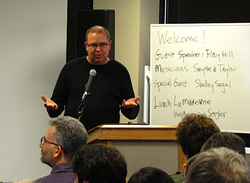
CatholicTechTalk offers three ideas for using social media to share our faith with others (without being too pushy).
| Gospel Living |
|
 CatholicTechTalk offers three ideas for using social media to share our faith with others (without being too pushy).
0 Comments
 Image: Pixabay, Creative Commons CC0 Image: Pixabay, Creative Commons CC0 Stephen Mattson confesses on Sojourners to being a "Hashtag Christian," one who projects an image of being an engaged Christian through social network sites, but doesn't follow through in real life: Religious Views: Christian — but not in practice. Christians need to move beyond comfort zones with apostolic zeal and a "healthy craziness", even risk becoming an annoyance as Paul did, according to Pope Francis. The Catholic News Service reports: The church doesn't need couch-potato Catholics, it needs believers with "apostolic zeal," willing to preach the uncomfortable words of Christ, Pope Francis said. "And if we annoy people" with this zeal for Christ, then "blessed be the Lord," he said in his daily morning Mass homily May 16.  Sunday gathering held by atheist groups may provoke some interesting questions to Catholic and Christians. The Religion News Service reports on Houston Oasis and other similar non-worship services. What questions might we ask?
From the article: Houston Oasis is part of a growing trend. Atheists and other nonbelievers have long gathered for events with meaning and music, but in the last year, a number of nontheistic groups have initiated Sunday morning events that include elements of a standard church service. America offers an overview of the growing importance of evangelization within the Catholic Church, including recent statements by Pope Francis. Scott Hahn also makes an argument for the connection between evangelization and the Mass.
In the pre-conclave meetings, before he was elected pope, Cardinal Bergoglio gave a challenging, prophetic speech on evangelization and the Church. He said the Church "is called to come out of herself" to evangelize and "go to the peripheries." In commentary relevant to "ecclesial institutions" from the upper echelon of the Catholic hierarchy down to the parish level: When the Church does not come out of herself to evangelize, she becomes self-referent and then she gets sick. (cf. The hunchback woman of the Gospel). The evils that over the course of time happen in ecclesial institutions have their root in a self-reference and a sort of theological narcissism. In Revelation, Jesus says that he is at the door and knocks. Evidently the text refers to his knocking from outside in order to enter but I think of the times in which Jesus knocks from within so that we will let him come out. The self-referent Church keeps Jesus Christ within herself and does not let him come out. |